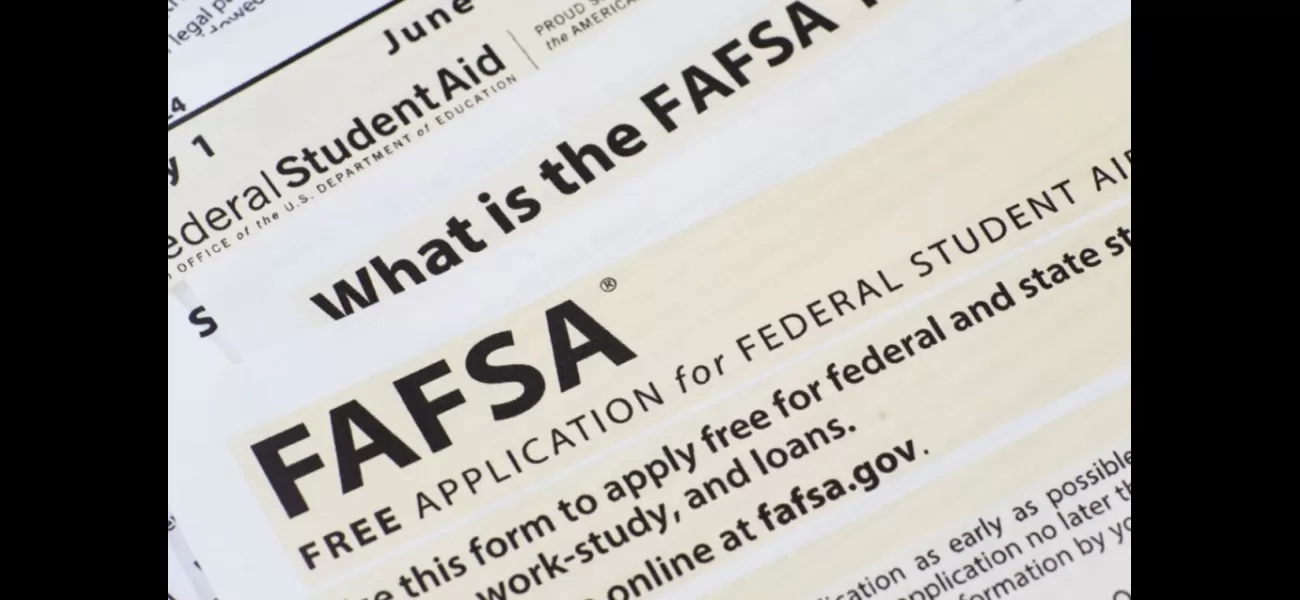Concerns arise as student aid is threatened by a drastic decrease in FAFSA applications.
Filling out the FAFSA may be chaotic this year, potentially causing students to lose out on important financial aid.
March 18th 2024.

There is growing concern over the significant decrease in applications for Free Application for Federal Student Aid (FAFSA), which could result in many students missing out on crucial financial assistance. The Department of Education's botched rollout of the application process is being blamed for this decline.
According to The Hill, only 5.7 million students have applied for FAFSA so far, a stark contrast to the usual 17 million applications at this stage. Karen McCarthy, vice president for public policy and federal relations at the National Association of Student Financial Aid Administrators, believes that the delayed availability and technical glitches at the beginning of the process may have caused some students to put off filing their FAFSA for the time being.
The National College Attainment Network has reported a 34 percent decrease in FAFSA applications from high school seniors compared to the previous cycle. This has left advocates scrambling to find ways to connect students with the financial aid they need before the application deadline.
The Department of Education has faced criticism for the technical difficulties that plagued the FAFSA application process, including limited availability and delayed data transmissions to schools, causing widespread frustration among applicants. Republican lawmakers have called for an investigation into the matter, while Democrats are seeking assurances from the Department of Education to alleviate the impact of the delays on families, particularly those from low-income backgrounds.
As the end of June approaches, it is a crucial time to assess the state of FAFSA applications and determine the best course of action moving forward. Bill DeBaun, senior director of data and strategic initiatives at NCAN, emphasized the need for proactive measures to salvage the cycle. "We can't rely on the same methods we've used in past years to achieve the desired results this FAFSA cycle," he stressed.
With the application process now underway, the focus shifts to colleges' ability to efficiently process FAFSA data. There is hope that smooth operations will allow for timely offers of financial aid to students. Families of incoming college students have expressed frustration with the delays in the FAFSA process, but there is still optimism that the situation can be resolved and students will receive the financial support they need to pursue their education.
According to The Hill, only 5.7 million students have applied for FAFSA so far, a stark contrast to the usual 17 million applications at this stage. Karen McCarthy, vice president for public policy and federal relations at the National Association of Student Financial Aid Administrators, believes that the delayed availability and technical glitches at the beginning of the process may have caused some students to put off filing their FAFSA for the time being.
The National College Attainment Network has reported a 34 percent decrease in FAFSA applications from high school seniors compared to the previous cycle. This has left advocates scrambling to find ways to connect students with the financial aid they need before the application deadline.
The Department of Education has faced criticism for the technical difficulties that plagued the FAFSA application process, including limited availability and delayed data transmissions to schools, causing widespread frustration among applicants. Republican lawmakers have called for an investigation into the matter, while Democrats are seeking assurances from the Department of Education to alleviate the impact of the delays on families, particularly those from low-income backgrounds.
As the end of June approaches, it is a crucial time to assess the state of FAFSA applications and determine the best course of action moving forward. Bill DeBaun, senior director of data and strategic initiatives at NCAN, emphasized the need for proactive measures to salvage the cycle. "We can't rely on the same methods we've used in past years to achieve the desired results this FAFSA cycle," he stressed.
With the application process now underway, the focus shifts to colleges' ability to efficiently process FAFSA data. There is hope that smooth operations will allow for timely offers of financial aid to students. Families of incoming college students have expressed frustration with the delays in the FAFSA process, but there is still optimism that the situation can be resolved and students will receive the financial support they need to pursue their education.
[This article has been trending online recently and has been generated with AI. Your feed is customized.]
[Generative AI is experimental.]
0
0
Submit Comment





